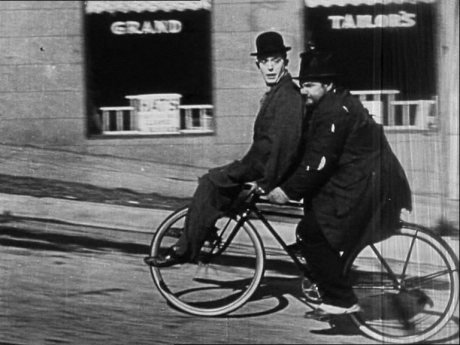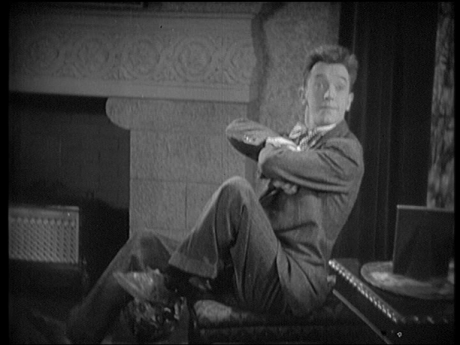I’ve been a fan of Laurel and Hardy films since I was a child when the BBC used to screen their films as schedule fillers at weekends and during school holidays and, like many fans, I’ve also visited the little gem of a museum in nearby Ulverston, the small Lake District town that was Stan Laurel’s birth place. With the release of a new biopic about the pair I’ve been rewatching some of their films and have been struck again by the absence of bicycles. This is initially surprising since bicycles were a standard tool of slapstick screen comedians. Along with umbrellas, revolving doors, ladders, sash windows, mangles or folding beds, in the hands of a slapstick comedian they become what film historian Tom Gunning describes as ‘mischief devices’: ‘machines whose purpose is to stop things from working, or make them work in an explosive counterproductive way’. While the bicycle was a key prop for some comedians – especially their contemporary Al St John who often appeared with Buster Keaton and Roscoe Arbuckle and had worked as a trick cyclist on the vaudeville stage before being hired by Mack Sennett at Keystone Studios after a demonstration of his skills – it is only occasionally encountered by Laurel and Hardy. Whereas the bicycle is an obvious prop for performers such as St John, Buster Keaton, or Harold Lloyd who specialized in impressively athletic, kinetic physical comedy, by contrast the comedy of Laurel and Hardy makes a virtue of slow, deliberate movement, of measured repetition and sometimes painful predictability.

At the opening of Air-Raid Wardens (SedgwIck, 1943), the pair are owners of a bicycle shop, the latest in a string of failed businesses, but this has no particular significance in a propagandist film that focuses on their accidental discovery of a plot by Nazi spies to blow up a magnesium plant supplying materials for weapons manufacturing in support of the war effort. This was one of their last films and, by then in their 60s, neither of them rides one of the bikes they are selling.

Although they both appear in the silent short Duck Soup (Guiol, 1927), it was released a few months before they began to be presented as a double act. A more typically subversive slapstick film, it begins with the pair playing two homeless friends who attempt to escape conscription by forest rangers to help fight forest fires by stealing a bicycle and fleeing. As Ollie pedals strenuously, with Stan perched on the handlebars, the chain snaps and the brakes fail as they race out of control down a steep hill. ‘The carburetor is shot!’, Stan shouts unhelpfully, and the bicycle collapses beneath them when they reach the bottom of the hill (whereupon they hide in a nearby house and are forced to pose as the owner of the house and the maid – it was later remade as the much better known sound film, Another Fine Mess (Parrott, 1930)).
The oddly titled We Faw Down (McCarey, 1928) is a far more sophisticated film, directed by Leo McCarey who went on to direct some of the finest Hollywood comedies including the Marx Brothers’ film, Duck Soup (1933) (which took its title from the Laurel and Hardy film above on which McCarey worked as supervising director). Later remade as Sons of the Desert (Seiter, 1933), one of the most treasured films among Laurel and Hardy fans that gave its name to the international appreciation society, it tells the story of the pair escaping from their wives one afternoon on the pretence that they are attending a business meeting at the Orpheum Theatre but really intending to ‘make whoopee’. While they are out, they find themselves drenched by a street-cleaning truck while gallantly retrieving a woman’s hat from under a car. The two women invite them to their flat to dry their clothes whereupon the boyfriend of one of the women, boxer ‘One-round Kelly’ returns to the flat and the terrified Stan and Ollie jump out the window semi-clothed. Their wives see them escaping from the window since they had been hurrying anxiously to the Orpheum theatre themselves after reading a newspaper headline that said it had caught fire that afternoon. When the men return home they unwittingly claim to have been to the theatre and as Hardy’s furious wife quizzes him about the show, Laurel tries to help him by miming the acts listed in a newspaper advert. The first act on the bill is a trick cyclist and so Laurel holds up a pack of ‘Bicycle’ playing cards, leading his friend to guess that it was a magic act. Stan then attempts to mime trick cycling, leading Ollie to misread the hint as ‘Russian dancing’.



It’s one of the funniest gags in a very funny film that might be understood as a self-reflexive commentary upon the status of silent comedy at the moment in which sound cinema was becoming more common, but it’s also historically interesting since it is an indication of the continuity from variety theatre to early cinema (in terms of performers, performance techniques, storytelling devices and thematic material). It is also a reminder that this is a lineage that is not specific to American cinema but has international parallels. For example, the professional career of screen comedian Jacques Tati, the film-maker most closely associated with the comedy of the bicycle (along with various other vehicles) began with a stage act called ‘Sporting Impressions’, in which he mimed various activities including cycling. As the novelist Colette wrote in a 1936 review of his performance, ‘no festive, artistic or acrobatic spectacle could equal the displays given by this astonishing man who has invented something which includes dancing, sport, satire and pageantry. He has created at the same time the player, the ball and the racket; the balloon and the person floating in it; the boxer and his adversary; the bicycle and the cyclist’ (Maddock: 26). Although the bicycle has a minor place within the repertoire of mischief devices in the cinema of Laurel and Hardy, its occasional presence is a reminder of the way in which their film comedy belongs to a complex transnational history of classic comic performance.
References:
Gunning , Tom. ‘ Crazy Machines in the Garden of Forking Paths: Mischief Gags and the Origins of American Film Comedy’, in Classical Hollywood Comedy, eds. Kristine Brunovska Karnick , Henry Jenkins, 87– 105. New York: Routledge , 1995.
Maddock, Brent. The Films of Jacques Tati . Metuchen, NJ: Scarecrow Press , 1977.